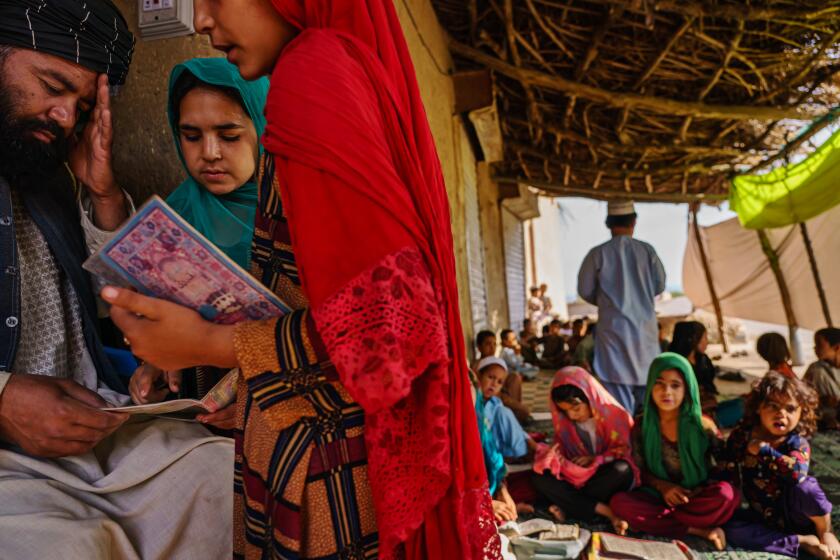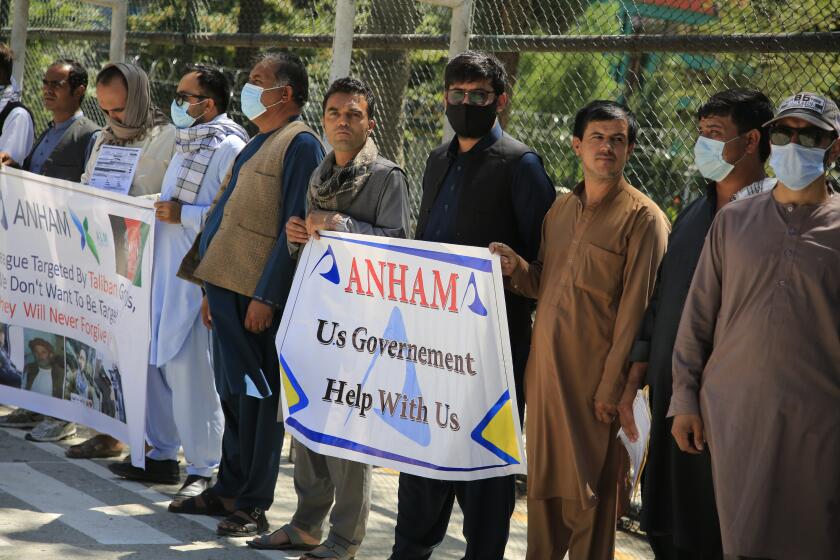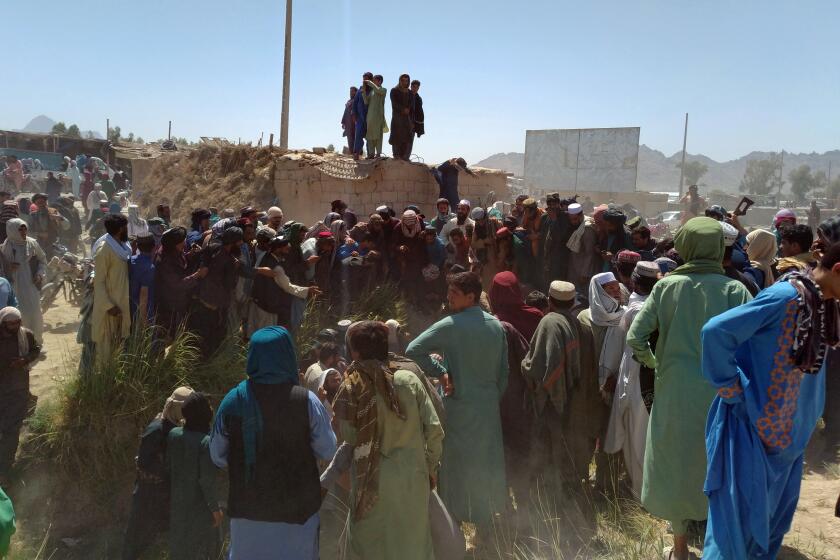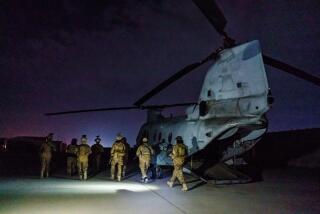With the Taliban surging across Afghanistan, Biden sends troops to move U.S. Embassy staff
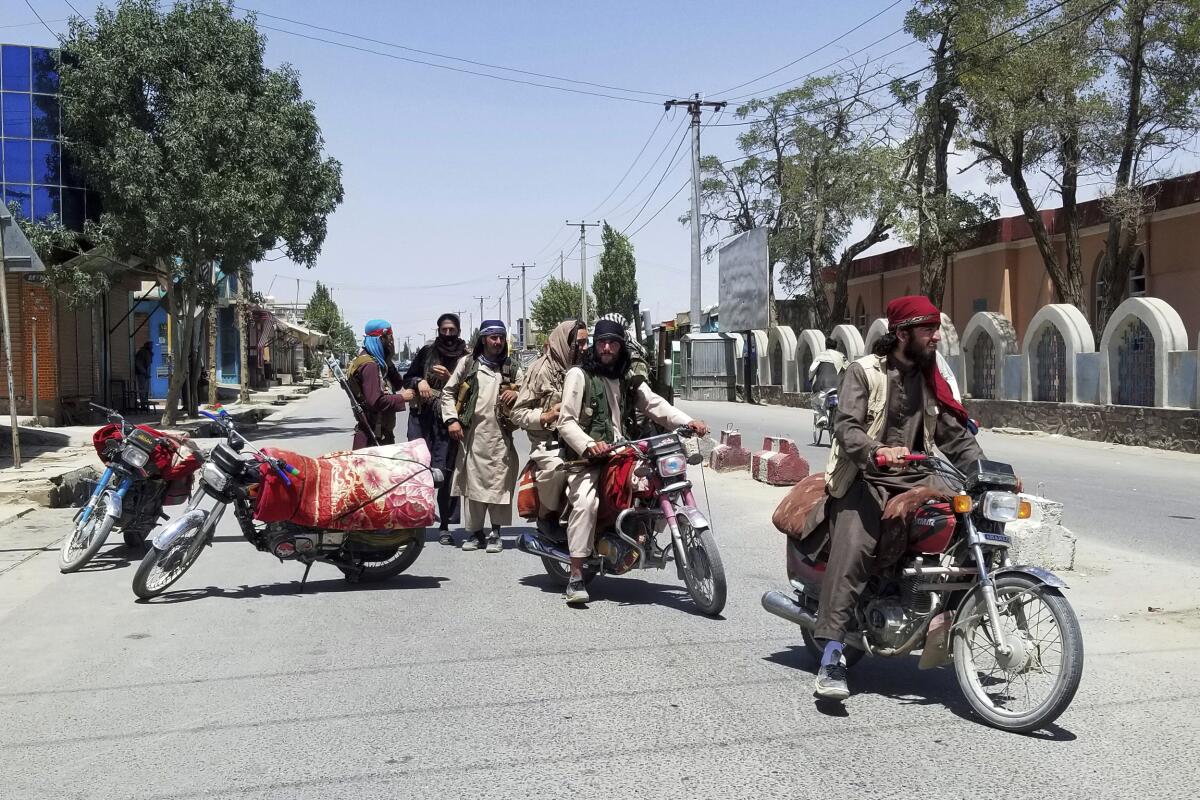
- Share via
WASHINGTON — The Biden administration, struggling to contain the rapid collapse of much of Afghanistan to Taliban forces, on Thursday announced it was pulling most U.S. Embassy personnel out of Kabul and urged American citizens — for the second time in a week — to leave the country immediately.
Several thousand U.S. troops will be dispatched to Afghanistan, mainly the Kabul airport, to help with what is shaping up as a military-run partial evacuation.
It was a significant escalation in a violently deteriorating situation. The urgent moves came as the Islamist Taliban group, in its quest to topple the U.S.-backed government, reportedly conquered Afghanistan’s second- and third-largest cities, Kandahar and Herat, respectively. Afghan refugees have flooded Kabul, many sleeping in the streets, and talks to reach a political solution are going nowhere.
State Department spokesman Ned Price said that the administration will substantially reduce its “civilian footprint” in Afghanistan to a “core diplomatic presence” in face of the grave violence spreading across the country, and that many employees will be relocated to the fortified Kabul airport for safety.
The moves are also likely to dismay an already desperate Afghan population. Many say they fear imprisonment, torture, repression and execution at the hands of the Taliban, who ruled brutally in the 1990s. The group says it has modernized, but there is little evidence to support that. U.S. officials and human rights groups say they are already receiving numerous reports of atrocities by Taliban forces, including executions of surrendering soldiers.
“The embassy remains open,” Price said — though he would not say if that meant in its current location. “We will complete our priority work.” But it clearly will become a skeleton operation.
As U.S. forces pull out from Afghanistan, the Taliban is in the ascendant — and threatening to retake the city that was its former spiritual capital.
Already, the State Department had reduced the number of its “nonessential” personnel in Kabul, once the site of one of the largest U.S. diplomatic missions in the world, and is constantly reviewing broader evacuation plans, officials said.
Officials hope to reduce the number of U.S. citizens in Afghanistan to avoid the need to mount large rescue operations if Kabul falls, which some analysts now believe could happen within weeks as the United States winds down its longest war and withdraws nearly all military forces. It especially does not want a Saigon-reminiscent, last-minute rescue of Americans at the embassy if Taliban forces march into the capital.
Yet the sight of helicopters airlifting American diplomats out of the Kabul embassy, and U.S. transport carriers ferrying Americans out of the country, would probably conjure up those images anyway — and sow panic.
The administration will also speed up the processing of special visas for Afghan translators and others who worked for U.S. military and diplomatic missions, part of a program Washington created to attempt to provide a haven for the former employees. But the process has moved slowly and many Afghans say they cannot even reach Kabul nor cross Taliban-controlled borders to avail themselves of the visas.
The Biden administration will allow refugee visas for more Afghans at risk for helping the U.S. as Taliban violence grows and American troops withdraw.
Senior national security officials launched a round of urgent consultations in the last 24 hours with Afghan President Ashraf Ghani. The Biden administration, which privately complains of debilitating divisions within the Afghan leadership, insists it will not change course in its withdrawal of U.S. military forces by Sept. 1, and has placed the responsibility for security squarely on the shoulders of the weak Afghan government and its army.
“They’ve got to fight for themselves, fight for their nation,” President Biden said earlier this week. “But they’ve got to want to fight.”
Pentagon spokesman John Kirby said Thursday that the removal of American officials from the Kabul embassy and from the airport will probably include airlifts. About 3,000 soldiers and Marines will join 650 U.S. service members already deployed in Kabul, Kirby said. Another 3,000 troops, including members of the 82nd Airborne out of Ft. Bragg, N.C., will be deployed as backup in nearby Qatar.
“This is a temporary mission ... a very narrowly focused mission of safeguarding the orderly reduction of civilian personnel out of Afghanistan,” Kirby said. Pressed repeatedly, he insisted it was not a combat mission, something that U.S. forces have not been involved in in Afghanistan for months, because Kabul was not yet a combat zone.
In Afghanistan, the Taliban now appears to have taken 12 of 34 provinces, roughly two-thirds of the country.
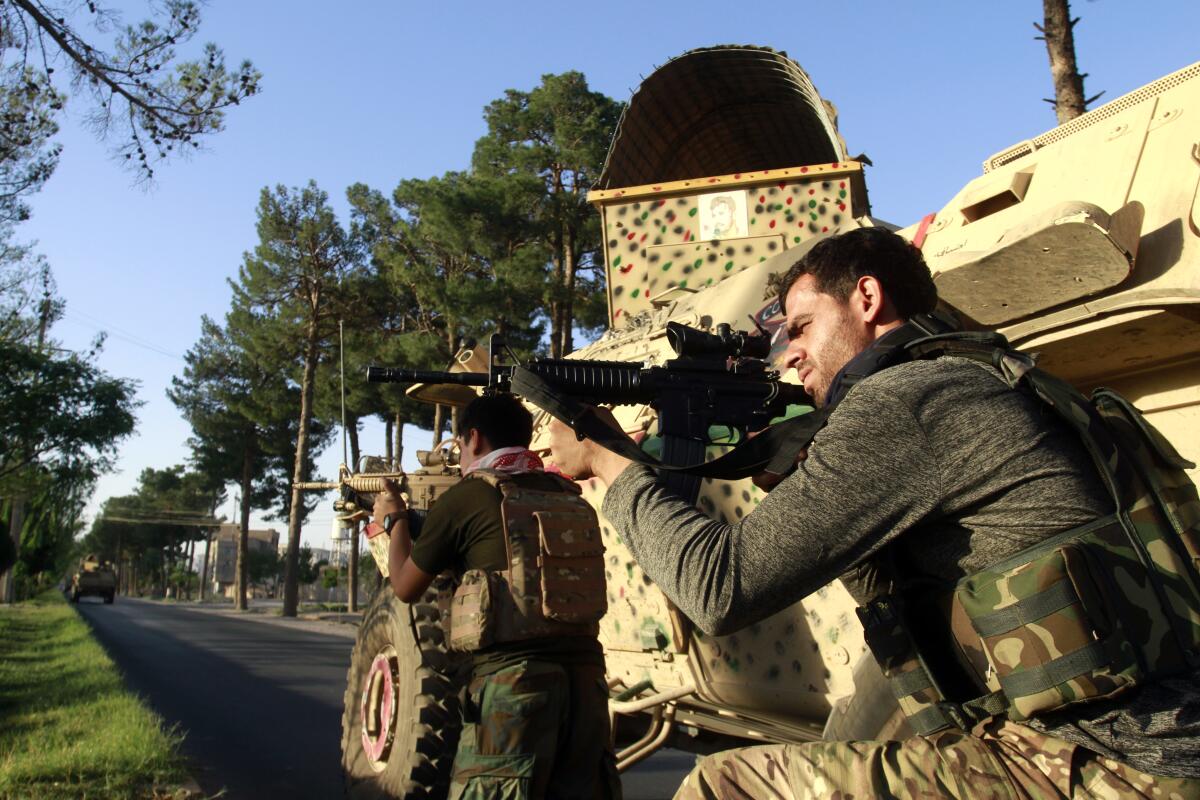
With Herat and Kandahar in the group’s hands, all eyes have turned to Mazar-i-Sharif, the fourth-largest city. With much of the north already under its control, the Taliban militants are set to begin a ferocious fight for Mazar-i-Sharif even as government-allied militia — now rallied by and enjoying the support of Ghani — vow they’ll claw back their traditionally anti-Taliban territories.
U.S. officials say they remain prepared to assist Afghan security forces with any tools except ground troops. But at the same time, they are openly blaming a lack of united leadership in the Afghan government and the erosion in fighting forces from years of corruption for the dramatic failures that have allowed the Taliban to advance.
A breathtaking run of battlefield success has put the Taliban in the ascendant and Afghan security forces on the back foot. Can they turn it around?
“There are other tools at our disposal that fall short of reintroducing U.S. forces,” Price, of the State Department, said earlier. “We have not ruled any of those out, and so if it’s appropriate for us to use them, we won’t hesitate to do so.”
He acknowledged the stunning speed of the Taliban’s movements and the terrible levels of violence. He added: “But at the same time, this is not a foregone conclusion, as many people seem to think, that this will be an inexorable march forward for the Taliban or any other force.”
The administration repeatedly asserts that the Afghan security forces enjoy numerical superiority over the Taliban because it fields 300,000 members, while the enemy only has 100,000 or fewer. But former diplomats who worked extensively in Afghanistan said the numbers are disingenuous. The 300,000 is diminished by tens of thousands of “ghost soldiers” who don’t exist but are used to pad payrolls and by thousands of members who aren’t actually fighters, they said. All taken, the government offensive army numbers are probably closer to those of the Taliban, experts say.
On the diplomatic front, the Biden administration regularly points to talks that have been taking place for months in Doha, Qatar, between representatives of the Afghan government and the Taliban. Special envoy Zalmay Khalilzad was dispatched urgently this week to the talks, but thus far the Taliban have shown little interest in declaring peace with the Ghani government.
“There is no realistic possibility that the Taliban will engage in deal-making until they have achieved more on the battleground — either as far as they can go or need to go to dominate the negotiating table,” said Laurel Miller, a former acting special representative for Afghanistan now at the International Crisis Group.
With the talks foundering, and U.S. disappointment in Ghani’s management of the conflict fading, the Afghan president is coming under growing pressure to resign. The president of Afghanistan‘s rival in Pakistan, Imran Khan, said Thursday the Taliban will not agree to further talks while Ghani remains in office.
Times staff writer Nabih Bulos in Beirut contributed to this report.
Amid drumbeat of disaster, here is why the fall of Herat bodes especially ill for Afghanistan.
More to Read
Get the L.A. Times Politics newsletter
Deeply reported insights into legislation, politics and policy from Sacramento, Washington and beyond. In your inbox twice per week.
You may occasionally receive promotional content from the Los Angeles Times.
